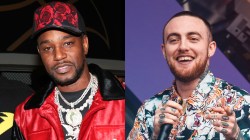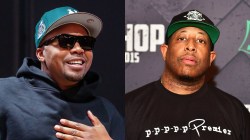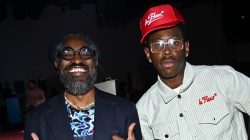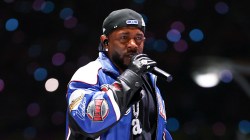With 18 years of service to Hip Hop culture, Tek and Steele of Smif-N-Wessun are rappers who, at present, bridge two golden creative eras in Rap music. The Book Camp Clik affiliates were upstarts benefiting from the success of Black Moon’s 1993 album Enta Da Stage on their 1995 debut Dah Shinin’. Now as the duo releases their 2013 EP Born and Raised, they are respected members of Rap’s veteran class maintaining true school roots in a wild new era. Reflecting these unique times, Tek and Steele work within West Indian Reggae and Dancehall on the new EP, creating a sonic bridge that—for those who think, “Rap bridging genres” and think of Dubstep and Electro—feels a lot more organic and sonically inviting.
“This EP was gonna be made regardless, because being how we came out officially from Boot Camp, it’s impossible that this wouldn’t be made,” Tek explained. “There was no doubt that this was going to happen. We always wanted to do this, but the timing was never right. Once we put it together, the timing was perfect.”
HipHopDX had the opportunity to discuss the bridge between Rap and Reggae, as well as the group’s secrets to their longevity and what ultimately makes the new EP progressive, yet still bearing a classic style. Enjoy!
Tek & Steele Detail The Bond Between Hip Hop & Reggae
HipHopDX: Born and Raised blends Rap with the sounds of Reggae and Dancehall. Do you believe that these styles can share the same space equally, and if so, why?
Tek: To me, [Reggae and Dancehall] are forms of music [of which] I am a big fan. I’m blessed to have the talent, know how and patience to [rap over those riddims]. It’s a great form of expression. It strengthens the bonds between people and heals the bonds of broken souls.
Steele: Hip Hop is the bastard of all music. All generations have rebel music. Hip Hop made every facet of music their own. Hip Hop borrows from Folk, to Salsa, to Jazz, and classical too. Reggae [was] already in there. Hip Hop is a gumbo of music. You listen to the layers, and you hear Latin drums and the steel pan and drums, from Reggae.
DX: What about the music that you listened to in your musical development aided in your ability (throughout your careers, actually) to navigate and find your voices in these genres?
Steele: Everything. I listened to Rock, Soul and Jazz growing up. My father had turntables and Tek’s dad played instruments. [As far as Reggae], I listened to Musical Youth, Sly and Robbie and of course, Bob Marley. It was difficult to not to grow into it. My little brother (Top Dawg from OGC) was into Reggae. I’d go to this small radio station in my neighborhood growing up to hear underground Rap, and while I was doing that, he’d buy Reggae tapes from the store. All he ever listened to was Reggae, so I’d ask him sometimes, “You’re not going to switch it up?” He never did! My uncle Guy was a fanatic for these VHS tapes of Soundclash battles, too. Also, there were always hooky parties and hearing Shabba Ranks, hanging out on East Flatbush and Canarsie where the West Indian Culture vibes were heavy.
Tek: Yeah. everything Steele said, and I was heavy into Supercat, Yellowman and Black Uhuru.
Why Tek Says He Always Wanted To Make “Born and Raised”
DX: What precipitated your decision to put together this EP? Snoop Dogg and many others are getting inspired by reggae vibes these days. Did that play a part in this?
Tek: This EP was gonna be made regardless, because being how we came out officially from Boot Camp, it’s impossible that this wouldn’t be made. There was no doubt that this was going to happen. We always wanted to do this, but the timing was never right. Once we put it together, the timing was perfect. [Working in the Dancehall and Reggae realm] is natural for us. We never try to force the issue. We don’t talk patois or anything. We have a respect for the culture. We practice these things. This is a natural ebb and flow. It’s dope to see Snoop Lion evolve and get inspired, too. This music has that impact east to west and north to south. Foxy Brown is of West Indian descent, too. We are pioneers of the mash-up, making [musical] food for the people.
DX: A name that many people are unaware of in Rap circles that plays a huge part on pulling this EP together is Jahdan Blakkamoore. He’s worked with Major Lazer, and he was part of the team that put together Snoop Lion’s project. Your thoughts about what he brought to the table?
Tek: Jahdan is a blessing, He has a great background and is very humble. My man Gordon introduced me to him by saying, “This is my bredren’s music.” I listened, and I knew he was perfect. He’s done writing for Snoop and a bunch of other people, too. It’s a blessing. It feels good to have good people around you.
Steele On Societal Ills & Hip Hop’s Evolution
DX: What is your favorite track on the EP?
Tek: Each time we went in to record, the vibe was different. It’s crazy to ask, “What’s your favorite?” I don’t want to pick just one. Everything we do is a “favorite.” There’s a different mood as to why each song was recorded.
Steele: I have a good story about one of my favorites. We have a song on the EP called “Shots in the Dark.” I came in the house last night, and, yeah, I was a little drunk, but I definitely wanted to keep the party going. The lights were off in the kitchen as I poured some vodka in the shotglass, and the song hit me again. Shots in the dark! That song…I love that chorus. I watched it being created. That chorus speaks to what we’re going through in society right now, everything from what’s going on in “Chi-raq” to people getting shot on Atlantic Avenue in our hood. To see the desperation in people’s eyes, you realize that there has to be another way. “We killing everyting…every bloodclaat ting.” As harsh as it is, our society makes us do things we can’t bear. That song is all about preaching without preaching, like an undercover message
DX: When you guys hit the scene in 1995, it was during an era in which there were so many hungry, young rappers getting opportunities to be as progressive as possible because Hip Hop culture was reaching new audiences. In many ways, it’s very similar to right now in the game. Your thoughts about those similarities and how young rappers should handle this era of access and change?
Steele: It’s mind blowing. On our very first single “Bucktown”’s last verse, we already did this science when we said, “What goes around comes around.” We’ve always tried to be the way we want things want to be. That means being real and upfront [with our delivery and message]. We’re always waiting to see things come around [to making that important again]. It’s dope to hear veterans like Eminem on “Rap God” able to remember the roots. Also, Kendrick [Lamar] changing the game is dope, too. [Speaking of access], the Internet allows us to get a taste of the good, bad and ugly. Overall, you have to remember that to whom much is given, much is required.
RELATED: Smif-n-Wessun & Pete Rock: Monumental Trinity [Interview]



![Method Man Admits He Didn't Like Drake's "Wu-Tang Forever": "I [Wasn't] Getting On That"](https://hiphopdx.com/wp-content/uploads/2025/12/method-man-drake-wu-tang-forever-remix.jpg?w=250)






Very nice project from Tek & Steele but no mention of Jamaican-Brooklyn Biggie? Granted, Big & OGC had a little beef but…
BCC been the shit this is Real Hiphop
“The Book Camp Clik affiliates” LOL
it’s a shame that BCC never got their full props. They’ve made at least 4 classic albums, Enta Da Stage (Black Moon), Da Shinin’ (Smif-N-Wessun), Knocturnal (Heltah Skeltah), and Da Storm (OGC).
my best friend’s sister makes $78/hr on the laptop. She has been without work for eight months but last month her income was $12067 just working on the laptop for a few hours. visit the site……
http://www.Jobs84.com
Irrelevant Niggas Detail Exporing Their Irrelevant Roots On Irrelevant Album
Is this your attempt at relevance?
How are they Boot Camp “affiliates”?
They are members since day one. Their debut is probably the best BCC album of all